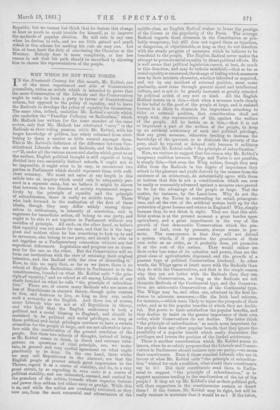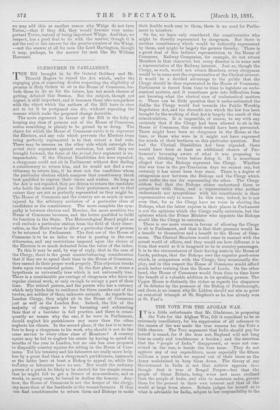WHY WHIGS DO NOT TURN TORIES.
IN the Nineteenth Century for this month, Mr. Kebbel, one of the most experienced and able of Conservative journalists, writes an article which is intended to prove that the more Conservative of the Liberals and tho Conservatives ought to unite to form a party in favour of Constitutional
reform, but opposed to the policy of equality, and to leave the Radicals to develope the policy of equality for themselves. The same idea, indeed, underlies Mr. Kebbel's article which also underlies the "Familiar Colloquy on Radicalism," which Mr. MaHoek has written for the same number of the same review, only that Mr. Mallock has attributed " envy "to the Radicals as their ruling passion, while Mr. Kebbel, with his larger knowledge of politics, has wisely refrained from attri- buting to them a motive so little current amongst them. This is Mr. Kebbel's definition of the difference between Con- stitutional Liberals who are not Radicals, and the Radicals —" If, under all the various names and shades which greet us on the surface, English political thought is still capable of being divided into two essentially distinct schools, it ought not to be impossible, it ought even to be easy, to reconstruct two parties in Parliament which should represent them with suffi- cient accuracy. We must not enter at any length in this article into an inquiry which could only be adequately pur- sued in a separate essay, but we believe it might be shown that between the two theories of society represented respec- tively by the principle of equality and the principle of subordination, there is really no middle term. Those who look forward to the realisation of the first of these ideals, though they may differ widely among them-
selves in enthusiasm, in intensity of conviction, and in eagerness for immediate action, all belong to one party, and ought to be able to act together in Parliament without any sacrifice of principle. All such, on the other hand, as believe that equality was not made for man, and that he is the hap- piest and noblest when he has something to look up to and to reverence, also belong to one party, and should be able to act together as a Parliamentary connection without any but superficial differences. Legislation and progress are as neces- sary for the one as the other. But the Conservative will re- form our institutions with the view of retaining their original intention, and the Radical with the view of discarding it." Now, to this we reply that, so far as we know, there is no school of English Radicalism, either in Parliament or in the constituencies, founded on what Mr. Kebbel calls "the Fin- ciple.of equality," and no school at all among Liberals of any shade founded on what he calls " the principle of subordina- tion." There are, of course, many Radicals who are more or less of Republicans in abstract theory, though quite content to live, and desirous to live, so long as they can, under such a monarchy as the English. And there are, of course, many Liberals who are not at all Republican in theory, and who hold that the English aristocracy is both a political and a social blessing to England, and should be sustained .in its political and social privileges, so long as those political and social privileges continue to have a certain attraction for the people at large, and are not allowed to inter- fere with the amelioration of the general. condition of the people. But these two schools of thought, instead of being, as Mr. Kebbel seems to think, in direct and extreme anta- gonism on questions of vital principle, aro, we main- tain, in general and very cordial agreement on what ought practically to be done. On the one hand, those whom we may call Republicans in the abstract., see that the English people at present attach great importance to the
i Throne, regard it as a centre of stability, and do, to a very
great extent, by so regarding it, even make it a centre of political stability, and are interested, amused, and excited by the grandeur of the nobles, towards whose superior fortune and power they seldom feel either envy or grudge. While this is so, and while the nobles are constantly recruited, as they now are, from the most successful and adventurous of the middle-class, no English Radical wishes to lower the prestige of the Crown or the popularity of the Peers. The average Radical regards these elements in the Constitution as pro- bably temporary, but still does not regard them as injurious, or dangerous, or objectionable, so long as they do not interfere with the steady progress of measures which he believes to be beneficial to the people. The English Radical never makes the attempt to promote social equality by direct political efforts. He is well aware that political legislation cannot, at best, do much in this direction, and may do infinite mischief,—that so far as social equality is concerned, the change of feeling which measures men by their intrinsic character, whether inherited or acquired, and not by any accident of external position, must come gradually, must come through general moral and intellectual culture, and is not to be greatly hastened or greatly retarded by political action of any sort or kind. All the English Radical insists on is this,—that when a measure tends clearly in his belief to the good of the people at large, and is resisted because it is likely to diminish the importance attaching to titles or external position, that consideration shall not weigh with any representative of his, against the welfare of the people. All he insists on is this,—that it is not so important a part of the welfare of the people, to keep up an artificial aristocracy of rank and political privilege, that any great measure, otherwise tending to increase the knowledge of the ignorant, or to diminish the poverty of the poor, shall be rejected or delayed only because it militates against what Mr. Kebbel calls " the principle of subordination."
Now, we venture to suggest that the reason why Mr. Kebbel's imaginary coalition between Whigs and Tories is not possible,. is simply this,—that even the Whig nobles, though they may differ from the Radicals in the degree of importance they attach to the pleasure and profit derived by the masses from the existence of an aristocracy, do substantially agree with them at bottom that this is not a consideration which can ever be easily or reasonably advanced against a measure once proved to be for the advantage of the people at largo. Test the matter, for instance, by the Land-laws. Why do not the Whigs join the Tories in contending for entail, primogeni- ture, and all the rest of the artificial system built up for the protection of great houses and estates in England I Why, simply because they do not think it right. They see that this arti- ficial system is at the present moment a great burden upon agriculture, and a great impediment in the way of the growth of that democratic Conservatism which the pos- session of land, even by peasants, always seems to pro- mote. The consequence is that they will not defend a system which, if it promotes the greatness of their own order as an order, as it probably does, yet promotes it at the coat of the nation. They would rather see their order lose some of its cohesion and power, than see the great class of agriculturists depressed, and the growth of a peasant type of political Conservatism hindered. In other words, the Whigs agree at heart more with the Radicals than they do with the Conservatives, and that is the simple reason why they can act better with the Radicals than they can with the Conservatives, so long as the Radicals are not theoretic Radicals of the Continental type, and the Conserva- tives are aristocratic Conservatives of the Continental type. The Whigs may be, and often are, reluctant in the first in- stance to advocate measures,—like the Irish land reforms, for instance,—which seem likely to injure the prospects of their order, and as to the popular benefits of which they are doubt ful. But prove to their satisfaction the popular benefits, and they decline to insist on the greater importance of their own order, while Conservatives do not decline. The latter think " the principle of subordination " so much more important for the people than any other popular benefit, that they ignore the possibility of a popular benefit which really diminishes the- privileges and lowers the position of the landed aristocracy.
There is another consideration which Mr. Kebbel seems to ignore, when lie so calmly proposes that the Liberals and Conser- vatives in Parliament should coalesce into one party,—we mean, their constituents. Even if those nominal Liberals who are in favour of what Mr. Kebbel calls "the principle of subordina- tion " wished for such a coalition, what would their constituents say to it ? Did their constituents send them to Parlia- ment to support "the principle of subordination," or to support measures tending to the amelioration of the lot of the people ? If they set up Mr. Kebbel's idol as their political god, will their supporters in the constituencies sustain or desert them?? If the former, Mr. Kebbel may be right, but will he really venture to maintain that it would be so ? If the latter, we may add this as another reason why Whigs do not turn Tories,—that if they did, they would become very unim- portant Tories, instead of being important Whigs. And that., we suspect, has a good deal to do with the matter, though it is not the real or fair answer for the greater number of the Whigs, —not the answer at all for men like Lord Hartington, though it may, perhaps, be the answer for men like Sir William Harcourt.



































 Previous page
Previous page